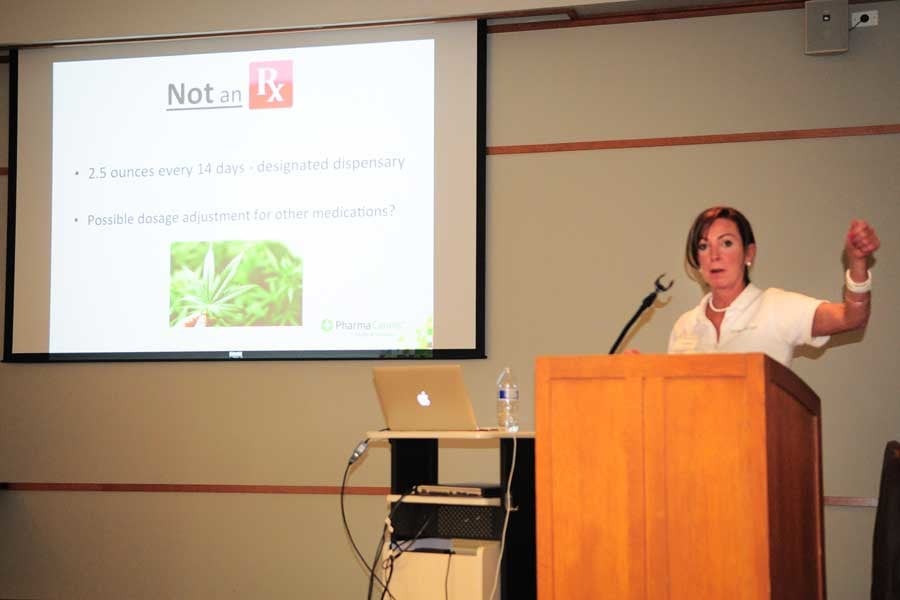Evanston medical marijuana dispensary slated to open mid-November
Fernanda Arreola/The Daily Northwestern
Patient development representative Liz Elliott speaks to Evanston residents about the benefits of medical marijuana as well as instructions on obtaining a medical card. Pharmacannis now plans to open its Evanston dispensary in mid-November.
October 18, 2015
Evanston’s medical marijuana dispensary will likely open in about one month after it receives deliveries of cannabis from two in-state cultivators, officials said.
Representatives from Pharmacannis, the medical marijuana provider, held a community meeting Saturday morning at Evanston Public Library at which officials spoke about the requirements to purchase the incoming products. Residents could apply for a medical marijuana card at the event. Pharmacannis plans to open the dispensary at 1804 Maple Ave., said Liz Elliott, a patient development representative for Pharmacannis.
The business currently operates four dispensaries in the state, with additional locations in Schaumburg, North Aurora and Ottawa.
“Our Evanston location is particularly unique,” Patty Park, a patient associate at Pharmacannis told The Daily. “We are the sole lot licensed to sell this type of product in the area according to legislative guidelines.”
The Pharmacannis dispensary will offer products such as edibles, topicals, oils and inhalation options such as vaporizers and smoking pipes.
The dispensary is able to open following the passage of a state law in 2013 that allowed patients to choose medical marijuana as an option to treat specific illnesses in accordance with regulations set by the state. The law states modern medical research has “confirmed the beneficial uses of cannabis” to treat symptoms such as postoperative pain and nausea. Among the approved conditions are glaucoma, cancer and AIDS.
Once operating, the dispensary will only be open to patients with medical marijuana cards.
To be able to use medical marijuana in the state, a patient must be an Illinois resident with a documented illness and have a relationship with a doctor that extends for more than a year. The physician is required to send a completed application to the Illinois Department of Public Health within 21 days of a patient seeking cannabis for medical use. A patient will be permitted up to 2.5 ounces of cannabis every 14 days.
Elliott, the patient development representative, said giving residents in Illinois an opportunity to explore marijuana for pain relief is critical given the dangers of pharmaceutical drugs. Elliott cited the highly addictive nature of prescription-grade painkillers as one of the primary reasons the benefits of medical cannabis should be explored, given the drug is not physically addictive.
“There are over 16,000 deaths associated with overdosing on pharmaceuticals every year,” Elliott said. “If you go to the DEA site, even though marijuana is listed as a Schedule I drug with a highly addictive profile, it says in plain writing, ‘No death from overdose on marijuana has ever been reported.’”
Although there is a lack of statistics to measure the demand of medical cannabis in the Evanston area, Elliott said she is confident residents will be pleased with what the dispensary will offer. All products contain a combination of THC, the psychoactive component of marijuana, and a chemical called CBD, which offers more therapeutic effects, she said.
The dispensary will be selling products with varying levels of THC, including those with higher levels of THC often used by cancer patients, Elliott said. Strains with lower levels of THC would often include higher levels of CBD, she said.
“People are under the impression that you’re going to walk around high all the time, and that’s definitely not the case,” Elliott said.
Rumualdo Rodriguez, a Chicago resident who has worked with autistic children, said the perceptions of marijuana as a highly dangerous drug are hindering progress in making marijuana a viable option for treatment. Rodriguez said the dispensary in Evanston is a step forward in establishing widespread acceptance of the drug.
“I heard on the radio about (Pharmacannis) before they came, and I thought, ‘Wow, they’re coming, that’s fantastic,’” Rodriguez said. “I’ve always thought Evanston was progressive in that way.”
Park told The Daily that despite legal protections offered to physicians and involved banks, some institutions are hesitant to participate in the business of medical marijuana. As a result, she said Pharmacannis has sought out the participation of independently owned banks and doctors with smaller practices.
Elliott said she hopes the dispensary will play a role in reducing some of the stigma associated with medical marijuana. She said this stigma leads to social problems such as incarceration of nonviolent offenders and racial disparities in arrest rates for possession.
“It’s not the plant — it’s power, control, politics and racism,” she said.
Correction: A previous version of this story misspelled the name of a patient development representative for Pharmacannis. Her name is Liz Elliott. The Daily regrets the error.
Email: [email protected]
Twitter: @elenasucharetza


